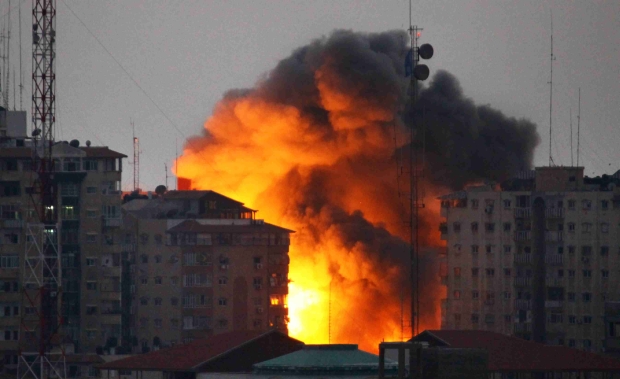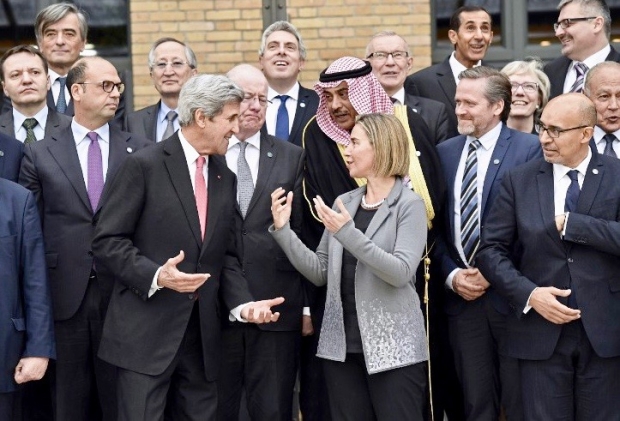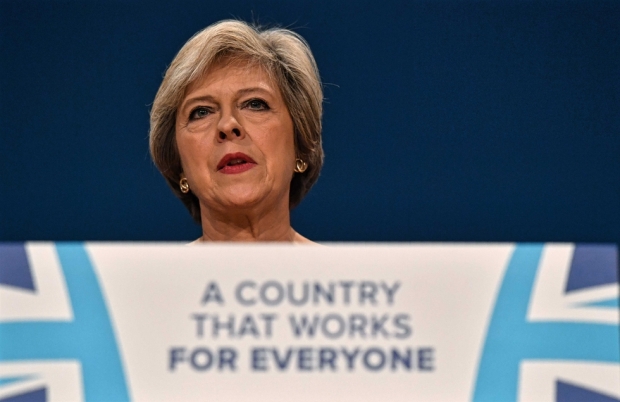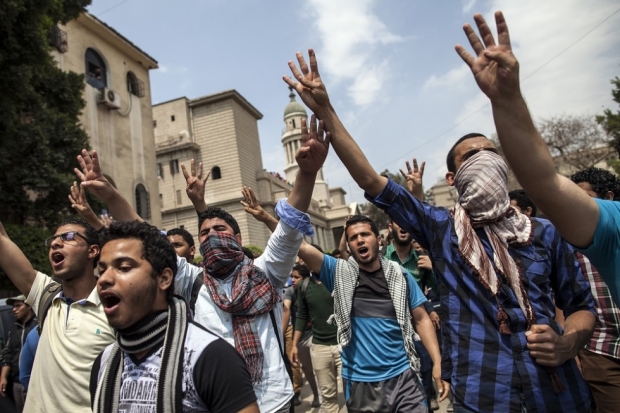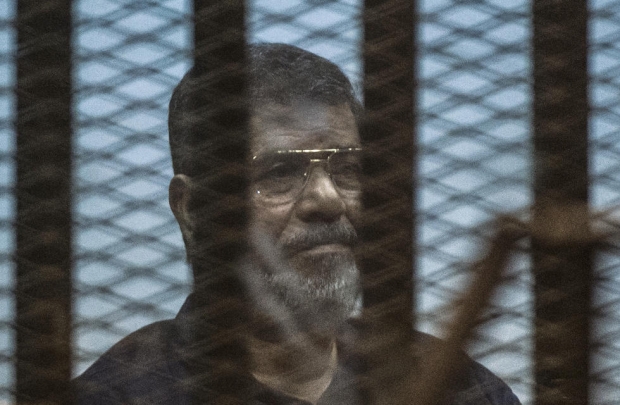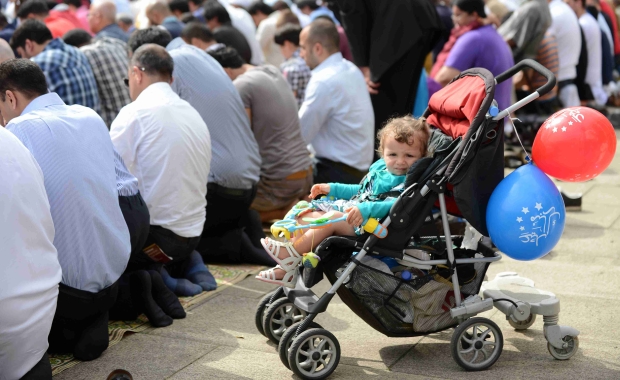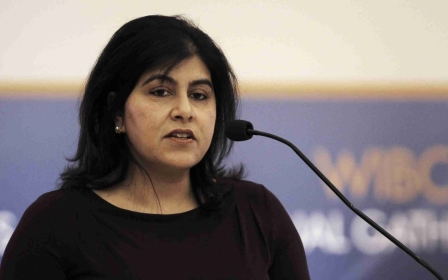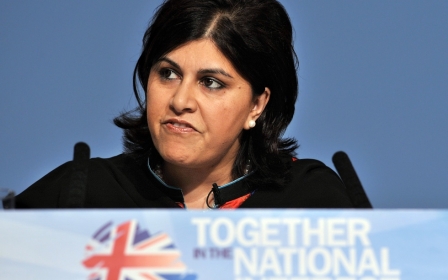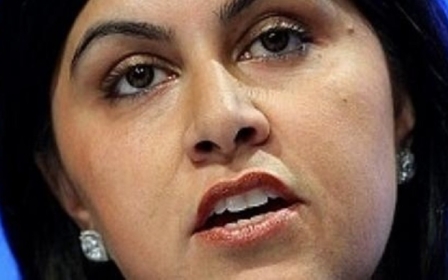Baroness Warsi on war in Gaza, Cabinet clashes and being called the 'enemy within'
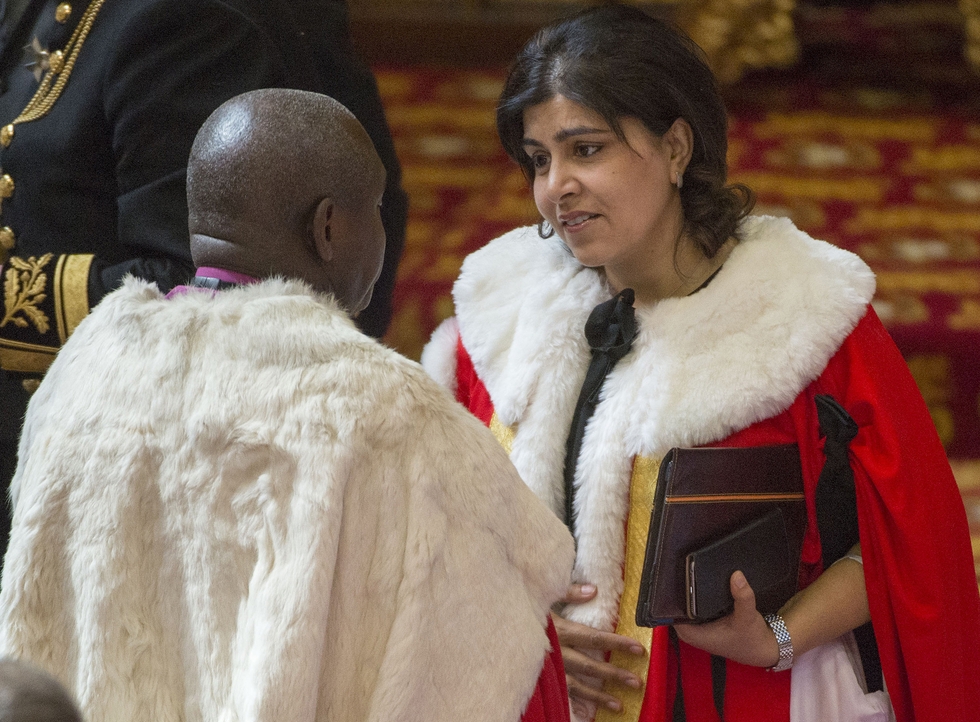
Editor's Note: Baroness Sayeeda Warsi, a former Conservative Party co-chair, was the first Muslim woman to hold a British cabinet post. She quit then-prime minister David Cameron's Conservative-led coalition government in 2014 in protest at its failure to condemn Israel's assault on Gaza. During her time as minister for faith and communities, she clashed with then-education minister Michael Gove about an alleged takeover bid by conservative Muslim groups, which installed sympathetic school governors in a so-called "Trojan horse" strategy in Birmingham.
MEE: Did you anguish about giving up a career in government? You are the first cabinet minister to resign over Gaza.
SW: I anguished over my relationship with David [Cameron]. If William [Hague] had remained as foreign secretary, I am not sure I could have walked away. Philip [Hammond] made it a whole load easier. I talk about it in the book and the conversations we had over human rights. It made it clear to me that he wasn't remotely committed to any of this. Therefore, it was a sign of the way foreign policy was going to work, and this was an extreme example of it. We believe in fundamentally different things. We weren't saying what we believe in and we weren't doing what we said. At that moment, I thought: "I am in such a different space here, David and I, I and the foreign secretary, whom I was working with." I said: "This is not for me."
I was the minister for human rights, the minister for the UN, the minister for the ICC. We were debating how we should vote at the Human Rights Council and what is our position on human rights violations. All of that was being discussed. I was being sent off to the House of Lords also on a daily basis. People were tabling questions on Gaza on a daily basis, as the situation was escalating, and I had to repeat government lines.
It came to the moment when I said enough is enough. I was so frustrated with what was going on. I didn't discuss it with anybody. It was one of those moments when the only person I spoke to was my husband and my parents. It was such a personal, individual decision. A lot of people who were close to me were quite shocked that I did it. I'd mentioned about my anguish, including to ministerial colleagues, and said I can't do this any more.
For me, it was a very personal decision. High office is there to make a difference. High office, for high office’s sake, doesn't hold anything for me. I know that leaving the job wasn't going to make any difference to me, because I had other interests.This isn't the be-all and the end-all of my life. What mattered to me was being in a position to make a difference, but when you are in a position that you are no longer making a difference, it's probably doing more harm by remaining there. A lot of people said to me “disagree and stay” but I think that's hypocrisy.
MEE: Do you think that war crimes were being committed by Israel in Gaza?
SW: Yes, I do. I fundamentally believe that our policy towards Israel is flawed. If you go back to statements that William Hague made, at the time of the recognition of Palestine as a state, the government said not now, maybe in six months' time [we would make a difference]. Now we are four or five years forward. What's changed? The settlements are still being built. There is no formal recognition [of Palestine], the peace process is no further forward. The reality on the ground is changing.
'All sorts of legitimate opposition to current Israeli government policy are now being seen as illegitimate. I think that we are in really bad space.'
When you have colleagues who stand up in Parliament and deny the right of Palestine to exist, as Rob Halfon [Conservative MP for Harlow] did when he said that Palestinians can live in Jordan, that's denying Palestinians a right to exist. All sorts of legitimate opposition to current Israeli government policy are now being seen as illegitimate.
I think that we are in really bad space. I think it has got a whole lot worse, and I could see this was a policy where all we were doing was placating for the moment and not really moving it anywhere. We had, as Europeans, a huge opportunity, rather than the US, on this policy. At the conference in Paris [in January], we showed a real lack of moral courage and leadership.
We cannot go back and rewrite our history. You can't write out Pakistan, just like we can't write out Israel. What concerns me is that when we end up with government or leadership, there are some in Pakistan who say it's just a country for Muslims, and it can persecute minorities and Christians.
I am just as furious when we look at [Lord] Balfour. [His declaration] was not just about Israel as a religious community, it was about Israelis of all religions, and the quality of work and value for these people. We haven't ever actioned that.
MEE: When people use the term “Israel supporters”, would it not be more accurate to say “Likud supporters”?
SW: There is a big difference. You can be a supporter of a nation's right to have a secure and stable future, but you can say that the government at the moment is vile. Members of the cabinet are feckless. All of that is questionable.
MEE: You say in your book that British citizens should face prosecution for becoming foreign fighters abroad. You do not mention Britons who go off to fight in the Israeli army.
SW: I do in the footnote.
MEE: Can you elaborate?
SW: One of the questions I asked the Foreign Office was that we have a distinction between state actors and non-state actors. If you go out there and fight for any group, you will be subject to prosecution when you get back. If you go out and fight for Assad, I presume, under our law, that is okay. That can't be right, especially for me, when I see, from a personal community perspective, if God forbid, India and Pakistan went to war, and British Indians and British Pakistanis started to enrol as soldiers, they would not be subject to prosecution.
The only reason we allow the loophole to exist is because of the IDF [Israel Defence Forces], because we are not brave enough to say if you hold British citizenship, you make a choice. You fight for our state only. That has to go out strong. Foreign fighters have been around since the Spanish Civil War, but in fact it goes right back to the Crusades.
'Belonging to Britain for Muslims is a thing we talk about a lot. We don't talk about it in relation to other communities. We accept that other communities hold all these multiple identities'
You have to belong to something, and belonging to Britain for Muslims is a thing we talk about a lot. We don't talk about it in relation to other communities. We accept that other communities hold all these multiple identities. We demand much greater loyalty of British nationals, I don't think that is wrong. But it's time to demand a greater loyalty from all. If you went out to fight for China, or what about Russia now, how do we think about that? Today's friend is tomorrow's enemy. Let's just shut down this loophole. If you don't fight for Britain, you do not fight.
MEE: You write in your book about the hostility to you in cabinet. How did that manifest itself and over what issues? Who told your special adviser to spy on you?
SW: I don't want to name names. He wasn't a civil servant. He wasn't actually security cleared. He was not government, just an ordinary private citizen.
MEE: Who sent him?
SW: I have no idea.
MEE: At the time you were minister for the foreign office, and someone in the Conservative Party asked your special adviser to report on you and you have no idea on whose behalf?
SW: They asked him to keep an eye on me, on whom I saw, and whom I did not see.
MEE: To this day you do not know whom it is?
SW: I know who it is. I have no idea if that request came from him, and how he operates. It didn't come from the PM. My relationship with David [Cameron] was frank enough for him to haul me in and say what's going on. I make this clear in the book. What we disagreed about were two policy areas. What we agreed on was much broader than that. In fact, I have given him a copy of the book. I told him I was writing this book before I told anyone else.
MEE: You write in your book that Cameron turned from a liberal on the issue of British Muslims to a neoconservative.
SW: Yes. His biggest influence is Michael Gove. David [Cameron] is quite a compassionate man, in the sense of the big society. It's the man he is. Then he changed. Part of this was the huge influence that Michael had over him, politically, but also privately, in their friendship. The book is not a series of polemics for me, it's about what he said first, then what he said next. I'm using his words. I had a great relationship with him, but he turned. I didn't change: he changed. The party around me changed. Had we remained in that space, we were considered libertine warriors. I took David to Dewsbury on 7/7. That was who I was. That was who David was. That's what I thought being a Conservative was.
MEE: And you became the “enemy within”?
SW: [Journalist] Douglas Murray called me the enemy within. He thinks there is a terrorist behind every chair. He has a view that every Muslim is part of the problem.
MEE: What had you done to deserve the label?
SW: It is a well-known fact that there was a tussle between my view, which is that radicalisation is not all about ideology, that there are many journeys to radicalisation and the opposing view that it is about ideology. [The concept of ] non-violent extremism is not the place we want to be. There is a distinction between integration policies and the Prevent stuff that we were doing. We are currently disengaging, we are speaking to fewer and fewer Muslims and this is wrong. There was a difference of opinion between where government policy was going, and people like me, Ken Clarke, [then-attorney general] Dominic Grieve and [then-deputy prime minister] Nick Clegg. Of those I was the only Muslim.
MEE: At the time home secretary Theresa May was closer to your camp and then appeared to change. The Home Office thought they had a much more intelligent appreciation of security matters than Downing Street had.
SW: I trusted the intelligence services and my conversations with MI5 and MI6. What I didn't trust were fellow politicians. Everybody else was happy to go back to evidence-based decision making, and then the mood started to change after the speech that David [Cameron] gave in Munich.Sometimes people are not strong enough to say no, you are wrong. There are 20 odd factors that lead to radicalisation. Personalities started to change. If you are in a job before the PM comes in, I think you are much stronger. If he gives you the job, it is more likely that you will go with what he wants.
MEE: It all came to an amazing bust-up in cabinet, about three years ago at a critical moment in modern politics, when aide Fiona Hill leaked a letter Theresa May had sent to Michael Gove about Islamist extremism in schools. The other adviser in Downing Street, Nick Timothy, was suspended from cabinet during this vicious departmental row.
SW: It was personal. Each cabinet minister was trying to prove that the other was weak on these issues. It was the politics of our time, and the newspapers were trying to prove that the other was weak. This was at a time when we had a soldier killed on our streets. And it takes a certain kind, to make policies in the heat of a terrorist attack. We will have more sadly, it is the nature of the beast. At that moment, even though Theresa was fundamentally right on so many issues, lots of people had leadership ambitions, Michael Gove, Theresa, George [Osborne] did. The last thing she wanted was to be seen as a weak home affairs minister. Michael was keen to paint her as the soft one on these issues. He was the tough one. If you read Liam Byrne's book, he basically says that we were dealing with a Trojan horse before Michael got hold of it. Which stops us from dealing with it, because he made it a national issue, an emotional issue. All credit to Nicky Morgan, she calmed the whole thing down.
MEE: Why did Theresa May, as home secretary, buy into the idea of non-violent extremism and the Prevent strategy?
SW: I think we need Prevent, or a Prevent-like organisation. For me, Prevent should be the space that parents trust. Prevent should be the space for me if I have concerns about what my children are doing. It's non-securitised, a safe space, which is all about safeguarding. It's supposed to be community-led, it's a community support mechanism. Actually, it has become something that parents now are defensive about. I believe there has got to be a pause, a review. You will never get CAGE to stand up and say we love Prevent. It is much bigger than they are now. There has got to be transparency about training manuals, about trainers and who they are, where they are going in.
MEE: In your book you propose the creation of a department of citizenship. In the wrong hands, that might be the perfect neoconservative tool.
SW: I think we have to have a structure for defining who we want to be. We have this concept of British values. I think it's reductive, it’s dishonest. It's used as a stick to beat minorities with. And most of it doesn't stand up to scrutiny. We should stop saying who we are and talk about who we want to be - a progressive, forward-looking inclusive nation. Irrespective of what we believe happened in Africa, India, the First and Second World Wars, we can all agree on who we want to be. If people in this country could say I don't want to be a nation where everyone is equal, where women have equal rights, where gay people can choose their sexuality, then you are choosing not to be part of who we want to be.
'We have this concept of British values. I think it's a reductive, it’s dishonest. It's used as a stick to beat minorities with'
But at least we are making the direction of travel clear. And I don't think the British values debate does that. If it did, the first thing we would be doing would be jumping on people on the far right, the kind of politicians who don't want Muslim babies born in America because they think it would destroy their country. These are fundamentally opposed to our core values. I don't like creating structures and departments. But I think it's a need of our time. Actually it's impossible for us to keep progressing and evolving what a British identity means, especially with what is happening in Ireland and Scotland. It's not just about the three million Muslims, it's more about the 60 million of us here, as to what it is we collectively aspire to.
MEE: Who was responsible for setting up the Jenkins review into the Muslim Brotherhood?
MEE: So if we said the review started in Abu Dhabi rather than Downing Street you would not disagree?
SW: I wouldn’t agree with you on that. What I would say is that its broader than just a Brotherhood review. On a number of occasions, I was concerned that it was the tail wagging the dog. That might not be a great example to give. People might be offended by this. For me, as British foreign office minister, I wanted to make sure that we were making the policy, and we were doing it here for us, for our benefit.
MEE: Was it about the need to secure a BP contract?
SW: My reading of a number of decisions by the government was that they were not in British interests.
MEE: Why do you write in your book that Britain did what it could with Egyptian President Abdel Fattah al-Sisi?
SW: We came to the Sisi period really slowly. I remember that feet were dragging at the time, which I was really pleased about, when I thought finally, we are going to grow a backbone, not just going to go along with it. One moment we were organising a state visit for [deposed president Mohamed] Morsi. The next minute he had been toppled and put in prison. We genuinely invested in that Morsi period. Genuinely thought this is a moment when you could bring in parties which may traditionally have been seen as not parties we would particularly favour, but that democracy was being chosen as a route. Loads of Muslim democracies were developing - in Turkey, in Tunisia, in Egypt - and were beginning to understand the difference between running a good economy, not corrupt, a bureaucracy being formed, and private, religious and personal beliefs. We genuinely felt we could develop that space. Then Sisi came in and cut across all of that. I think we were genuinely disturbed by that.
MEE: But not publicly...
SW: There were conferences we didn’t attend. Conferences he didn't get invited to. There was foot shuffling, until we looked around and realised that the caravan had moved on and we were left in the desert. We were trying to take a principled position, and everyone else just got on with it and we had to catch up. We had friends and allies who were concerned about our feet dragging at the time.
MEE: But the government did not. You were still in office when you called it a military coup?
SW: As far as I am aware.
MEE: You accuse the government in your book of disengaging with Muslims and working only with government-funded organisations like Quilliam.
SW: I thought I was kind to them
MEE: You described them as careerists...
SW: I told them exactly what was coming.
MEE: What about Policy Exchange?
SW: They got three emails and never replied. What I say in the book is that Quilliam have a voice, not a very credible one, rather destructive. They have a right to have their say. I don’t believe that they should completely be disengaged with. What concerns me is how government has found the most destructive voices on this debate, and chosen them to be their preferred partners in this debate. Why would you do that? Why would you take this bunch of people, when you have a whole plethora of people? Nobody speaks for everyone.
'Quilliam have a voice, not a very credible one, rather destructive. They have a right to have their say. I don’t believe that they should completely be disengaged with'
For me, the more people you speak to the better it is. Now for years, the government denied it had a disengagement process, and then I went public with it. Treat the Muslims as you would any other community. Don’t exceptionalise them. The government meets British jewish communities in an annual meeting where everyone gets round the table, all people who are respected and supported, who the community chooses, so why can’t they do the same for Muslims?
MEE: In what way are Muslims treated differently by the government?
SW: One of them is how we do festivals and how we do celebrations. A Muslim list is sent off to all sorts of people to check and double check. We do not do that for anybody else. There is a reality, it has to be documented. The Paranoid State was probably the hardest chapter to write, because it is the one that I wrote with the heaviest of hearts, it is deeply damaging and worrying for me to think that's where we have ended up.
MEE: The government should change its policy towards the Muslim Council of Britain. At the moment its cut out. But in Scotland and Wales, they talk to them.
SW: I think we give too much importance to the MCB. I think that they should be round the table. They are part of the picture, quite an important part of the picture. I don't think it serves anything for them to be cut out completely. I would much rather hear from a much broader range of people. Why are we not speaking to people who are so heavily engaged.
MEE : What is the extent of Islamophobia in the Tory ranks?
SW: I don't think you could say that there is Islamophobia in the Conservative Party. There are individuals within the Conservative Party who have little respect or regards for Muslims. Indeed they are actively hostile.
MEE: You quote Lynton Crosby who was the architect of the 2015 election. You are certain that he said it.
SW: I quoted what was in the public domain, I’m not going to assert it. When you say, is the Conservative Party Islamophobic? No, it isn’t, but there are individuals who have no regard. When you have people retweeting Tommy Robinson, where we have people putting out vile statements about Muslims, and no action is taken by the party. The party is setting itself up to fail on these issues. I’m not saying that the party is responsible for each and every individual’s action, but what it can show is what its views are. These matters have been brought to the attention of the party by me. I'm saying this is a growing problem, and as a party we need to do something about it. I've seen no formal process, no formal action.
MEE: What are your concerns for the future?
SW: I suppose I grew up in a racist world. I have done my bit. My grandfathers both served in the British Indian Army. My parents broke their backs in Dewsbury. I served my country at the top table. How many generations are going to give their loyalty before you stop saying to us "prove you are loyal". That is what they were. Who my forefathers were fighting. Somehow, I'm now accountable to them.
I am just about to become a grandmother. But will Britain be home to my grandchildren? It would be a tragedy if my grandchildren checked out of Britain. If my parents had run away when they first faced racism, you can't walk away from this. So, the socially mobile and financially successful will leave. So the Jewish Chronicle is giving Tommy Robinson free rein in an interview, what's that about? Until Muslims stop giving space to anti-semitism and vice versa, we are going to carry on fighting the battle. Now, slowly, there is a realisation going on. I have spent two decades fighting anti-semitism. I was called anti-semitic simply for taking a position on the current Israeli government. But I wish Muslims had a Gerald Ronson. We could do with having someone like that, absolutely committed to the security of our community.
MEE: What are your plans for the future?
SW: I have set up the Baroness Warsi Foundation. We are doing work around this. What do we want from a place of worship? I have set up an architectural competition, to design the quintessentially English mosque. I want people to say, put it in my village. I want to play my part to create a really strong British Muslim identity, a confident sure-footed British Muslim identity. I hope I can influence and change the way of thinking.
Middle East Eye propose une couverture et une analyse indépendantes et incomparables du Moyen-Orient, de l’Afrique du Nord et d’autres régions du monde. Pour en savoir plus sur la reprise de ce contenu et les frais qui s’appliquent, veuillez remplir ce formulaire [en anglais]. Pour en savoir plus sur MEE, cliquez ici [en anglais].


